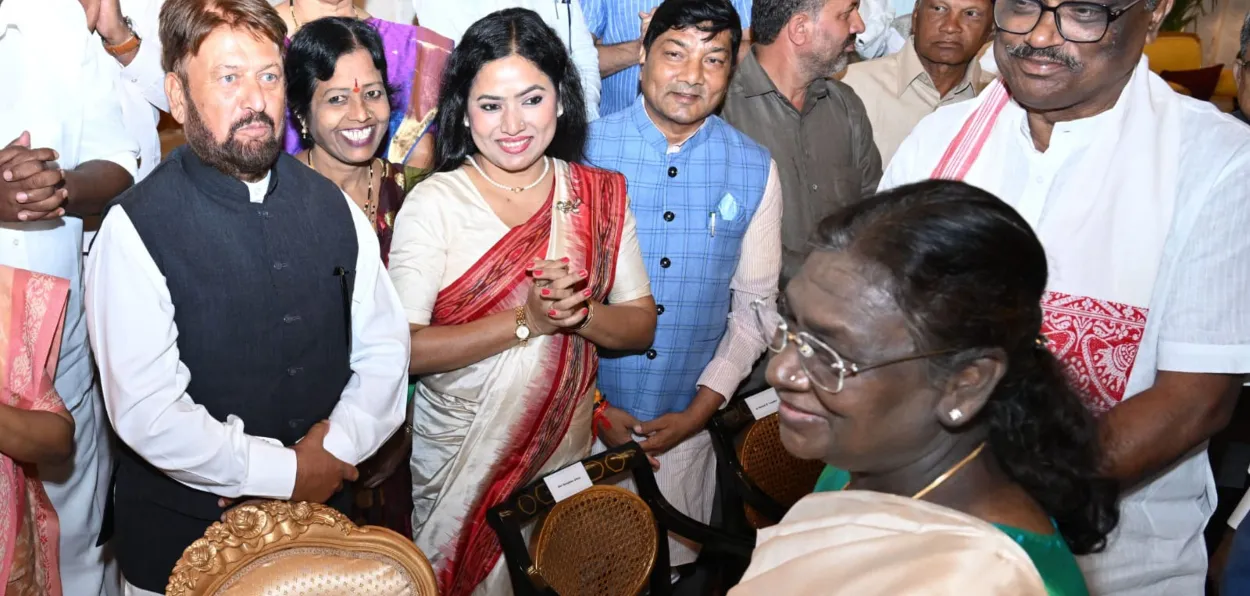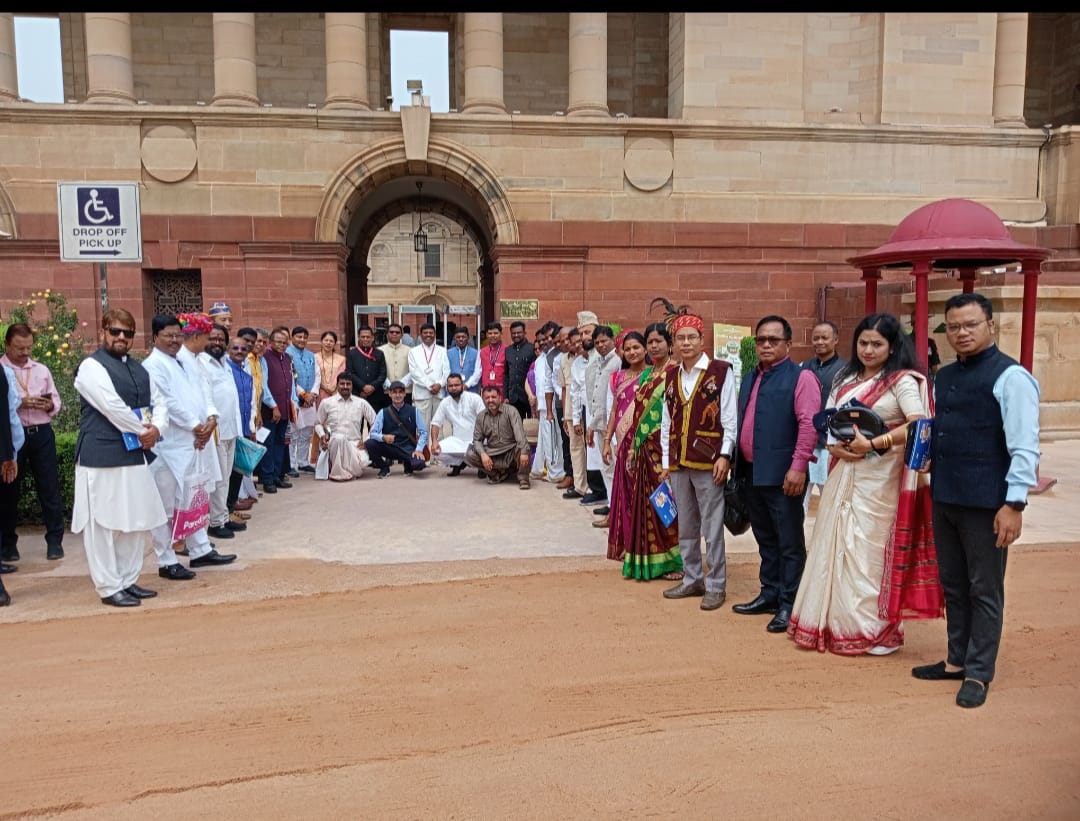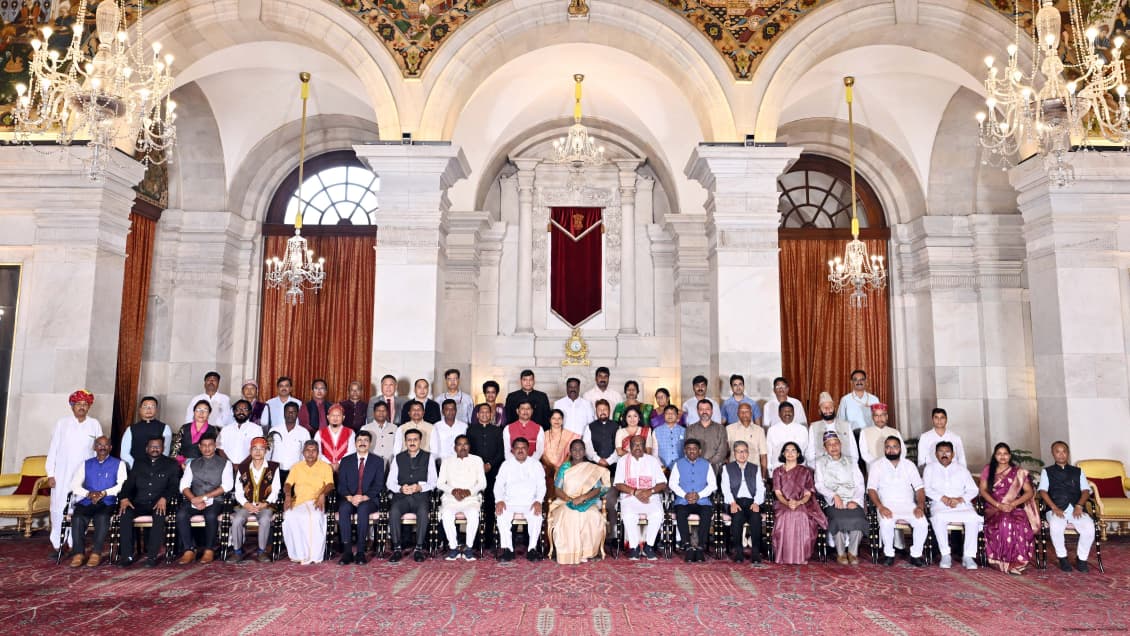
Ehsan Fazili/Srinagar
It was a rare occasion for a Pahari tribesman, who hails from one of the lesser-known communities of Jammu and Kashmir, to enter Rashtrapati Bhavan, and connect with 40 leaders of tribal communities from across the country.
Syed Shabir Ahmad Gilani and other tribal leaders were invited to the Rashtrapati Bhavan as part of a “Adi Karmayogi Abhiyan” of the Union Ministry of Tribal Affairs for meeting President Droupadi Murmu. The programme aims to generate dialogue and cooperation to shape the future of tribal communities.
“I am from Pahari Samudai of Jammu and Kashmir," Gilani spoke in front of President Droupadi Murmu. He told Awaz-the Voice that he is still in awe of the moment when these words echoed in the Rashtrapati Bhawan for the first time.

Syed Shabir Ahmad Gilani (Extreme left) with other leaders of tribal communities at Rashtrapati Bhavan
Syed Shabir Ahmad Gilani was among the front-ranking Pahari leaders whose 20-year struggle culminated in the community being granted Scheduled Tribe status.
A retired Senior Superintendent of Police (SSP) of the Jammu and Kashmir Police, Gilani hails from the remote Karnah area, on the Line of Control (LoC) in Kupwara district of North Kashmir.
The Pahari community of J&K had struggled for the ST status for three decades, while the Gujjars and the Bakarwal communities got it in 1991.
The Bill to grant ST status to the Paharis of Jammu and Kashmir was passed in February 2024 after Union Home Minister Amit Shah had announced it during public rallies in Baramulla and Rajouri in 2022.
 Group photo of Tribal leaders with President Droupadi Murmu
Group photo of Tribal leaders with President Droupadi Murmu
The same year, Prime Minister Narendra Modi, in his Independence Day address at the Red Fort, had also assured the same. Gilani says, “ J&K has over one million Paharis (10 Lakh) with high concentration in Rajouri and Poonch districts of the Jammu region and in Baramulla and Kupwara in Kashmir.However, the community is yet to receive the benefits of the ST status two years after it was granted to them.
Gilani said the community leaders have formed the Jammu and Kashmir Pahar Tribal Forum to raise awareness among the community about the benefits of this status.
Gilani told Awaz-the Voice: “The basic idea of establishing the Forum is to carry forward the Prime Minister Narendra Modi’s vision that ‘India will prosper when our tribal communities prosper, the welfare of the tribal community is our foremost priority’.
He said that the Government was implementing schemes for the empowerment and self-reliance of tribal people, which would be successful only with the cooperation and participation of the people. “So this Forum will work in light of the 'Adi Karmayogi Abhiyan', which is a Responsive Governance Programme and is a transformative national movement inspired by the Prime Minister”, Gilani said.
This campaign is to actualise the vision of “Sabka Sath, Sabka Vikas, Sabka Vishwas, Sabka Priyas”, which, in turn, is aligned with Viksit Bharat.
Gilani stated: “It redefines governance in tribal areas from top-down service delivery to bottom-up community-led transformation, positioning tribal citizens as leaders, innovators and custodians of their culture and developmental future”. He said that the Forum would be meeting higher officers in this connection and the implementation of various schemes. The Forum would also move across all the districts to create awareness among the population about the schemes.
“The grant of ST status is a great achievement for us. There were no reservations, and now all are under this category”, Gilani said and added that they would be getting benefits like Gujjar & Bakerwals in J&K as also in other parts of the country.
The Pahari leader, Syed Shabir Ahmad Gilani, is a member of the Muslim Personal Law Board and heads the Sadaat International, J&K as its president. He recalled his struggle as a Pahari living in far-flung and backwards areas during his college days. “Students from Ladakh were getting an educational scholarship of about Rs 70 per month as an incentive for belonging to far-flung and backward areas," Gilani said. It was when Pahari students from backward areas like Karnah and Keran, close to the LoC, also raised their voice for similar scholarships.
“We would march from the College to Gagribal (Nehru Park) to approach the then Chief Minister, Ghulam Mohammad Sadiq and put forth our case”, Gilani recalled.
Soon, the Pahari students were granted educational scholarships, and it resulted in more students going for higher education in Srinagar, Baramulla and Sopore colleges, Gilani said.
Recalling those days, Gilani said, the 70-km Kupwara-Tangdhar was often blocked. “The students coming from their college in Srinagar carried their baggage on their shoulders and walked at least 20 km up to Chowkibal, where some form of transport was available for Kupwara”, he said.
They would traverse through the Sadhna Pass (10269 ft from sea level), which often remained blocked during bad weather for more than six months of winter.
The continued struggle led to the launch of a Pahari language programme on the pattern of the Gojri language from Radio Kashmir Srinagar (now AIR) and a separate section in the J&K Academy of Art, Culture and Languages around the beginning of the 1980s.
ALSO READ: Is it time for the Taliban to rebuild the Bamiyan Buddhas?
Gilani says the leaders would travel across districts to generate awareness about the Government’s programmes for the benefit of the community.
